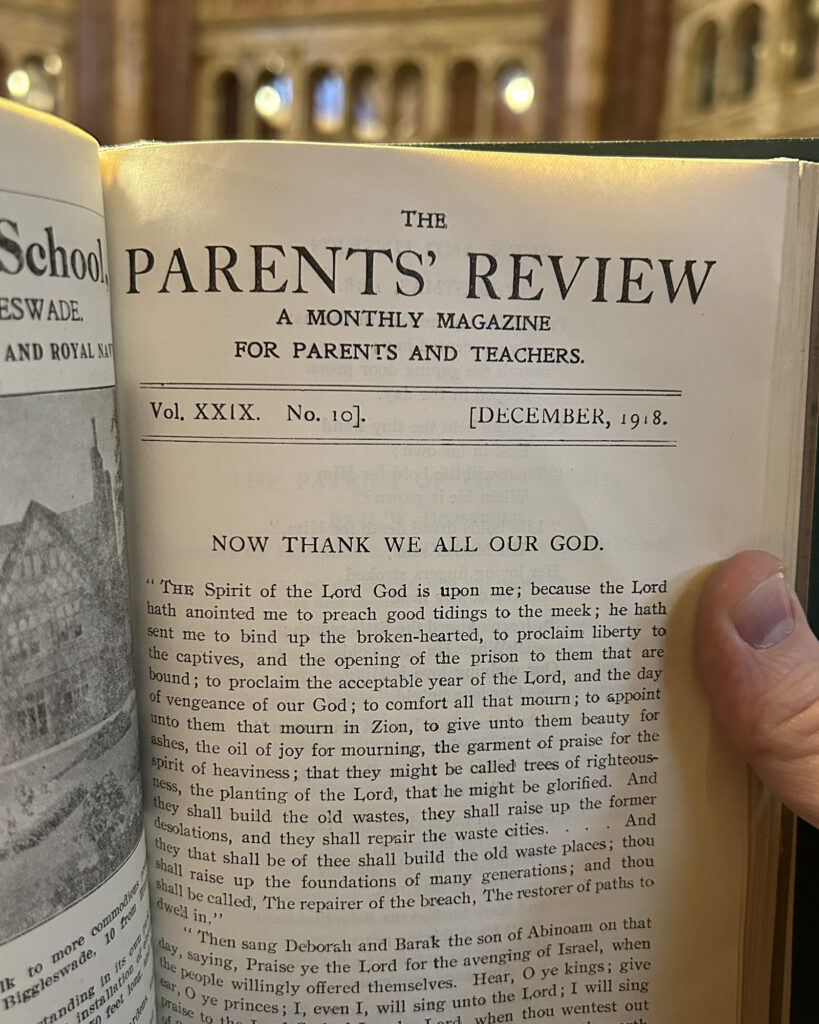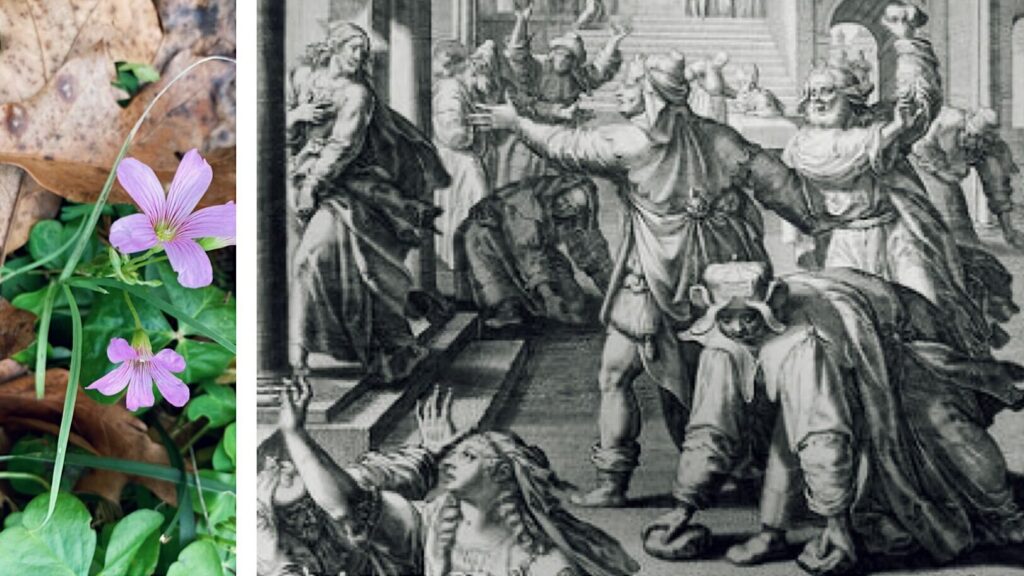The CMP Review — Week of November 20
November 20, 2023

“Open-air Memories should be Stored.—We have in these few lines a volume of reasons why we should fill for children the storehouse of memory with many open-air images, capable of giving them reflected sensations of extreme delight. Our constant care must be to secure that they do look, and listen, touch, and smell; and the way to this is by sympathetic action on our part: what we look at they will look at; the odours we perceive, they, too, will get.” (Vol 2 pp. 192–193)
@tessakeath
November 21, 2023

In 1912, Professor Henry W. Holmes of Harvard University made a stunning announcement:
We have no other example of an educational system—original at least in its systematic wholeness and in its practical application—worked out and inaugurated by the feminine mind and hand. It is remarkable, also, because it springs from a combination of womanly sympathy and intuition, broad social outlook, scientific training, intensive and long-continued study of educational problems, and to crown all, varied and unusual experience as a teacher and educational leader.
Professor Holmes wrote these words in the introduction of the first American edition of a book about … the Montessori method.
Charlotte Mason was shocked. “We have no other example,” wrote the professor! And what have I been doing these past 26 years, she must have thought to herself!
Miss Mason realized her legacy was at stake. The method she thought would change the world was now being eclipsed by not one but two new and idyllic methods of education.
Well, not if she could help it. Read or hear the astonishing 1912 article by Charlotte Mason in which she defined her own place in history. The article in which she made perhaps the most extraordinary claim in print about her method. A claim so many would dismiss out of hand — unless it had been made by Charlotte M. Mason herself. Find it here.
@artmiddlekauff
November 22, 2023
Do you write in your books?
I do—usually just an “X” next to something destined for my commonplace. One professor had us write in our own titles for each chapter of The Brothers Karamazov and I’ve kept up this helpful habit when reading especially heavy books.
Charlotte Mason had this to say about the use of books: “Let marginal notes be freely made, as neatly and beautifully as may be, for books should be handled with reverence. Let numbers, letters, underlining be used to help the eye and to save the needless fag of writing abstracts” (School Education, p. 181).
My current read is this beautiful 1948 edition of Pilgrim’s Inn by Elizabeth Goudge, with a whole new level of reverent “marking up” by fellow homeschooler @birdsandbobbles.
@rbaburina
November 23, 2023

Now thank we all our God
with heart and hands and voices,
who wondrous things has done,
in whom his world rejoices;
who from our mothers’ arms
has blessed us on our way
with countless gifts of love,
and still is ours today.
Happy Thanksgiving from the Charlotte Mason Poetry Team.
November 24, 2023

Two nights ago, Serafina and I went to see the amazing production by Manitoba Opera Li Keur: Riel’s Heart of the North. It is the first full-scale Indigenous-led opera presented on a Canadian opera mainstage.
The libretto, by Métis poet Dr. Suzanne M. Steele, tells a dramatic story (some historical fact, some historical fiction) of Louis Riel in the 1870s. Spoken and sung in five of the languages spoken in Manitoba: Southern Michif, French-Michif, Anishinaabemowin, French, and English, it was a treat for the ears as well as the eyes. The Winnipeg Symphony orchestra was marvellous, the costuming and set design were superb, and the choreography was incredible!
Some of our local Charlotte Mason homeschool friends took part in this production (the mom @daniellekirpluk was in the chorus and two of her girls were in the children’s chorus). It was amazing to see them in action!
This was a once in a lifetime experience and we are thrilled we were able to attend. It is so great when local history comes to life in this way!
Tonight is the final show. If you are in the Winnipeg area, go grab yourself a ticket!
@antonella.f.greco
November 25, 2023

Through the week’s busyness, I kept saying to myself, “I’ve got to go for a walk.” As the days passed and the pressure mounted, I repeated it aloud a handful of times. As I slid my laptop into my bag to work on while waiting for my youngest to finish class, my other son said, “Hey, have you been on the trail that runs through campus? Maybe you should take your walk there.”
By the time I’d arrived, the idea had elbowed its way past my to-do list and the trailhead was found. Ten steps into the woods and my shoulders relaxed. They relaxed even more as I stopped to inhale the fragrant yellow blooms of witch hazel. Then I heard the thin high whistle of a cedar waxwing and my heart soared—a friend from the northeast whom I hadn’t seen since moving to Tennessee. I followed his call to a grove of juniper, and, though I never caught sight of him, it was enough to know he was there.
So, this is where I am in life—my grown children now tell me to go out to play while the birds remind me that each day has enough trouble of its own. If you hear a whisper say, “Go for a walk,” be sure to heed it.
@rbaburina
November 26, 2023

Only once in the Gospel of John is Jesus formally accused of blasphemy. According to Leviticus 24, the penalty for blaspheming is to be stoned to death. When Christ’s auditors begin to pick up stones, Jesus responds by saying, “Is it not written in your law, ‘I said, “You are gods” ’? If He called them gods, to whom the word of God came (and the Scripture cannot be broken), do you say of Him whom the Father sanctified and sent into the world, ‘You are blaspheming,’ because I said, ‘I am the Son of God’?”
It is what Gail O’day describes as “an intricate argument from Scripture”:
Jesus’ argument … employs several exegetical techniques common to first- and second-century Jewish exegesis. Jesus’ exegesis may seem strained to contemporary exegetes, but it falls solidly within the range of exegetical approaches of first-century Judaism…
First, Jesus cites only the first half of Ps 82:6, even though he clearly presupposes the rest of the verse … in his argument (see v. 36).
Second, in rabbinic argumentation, a comparison could be made between two biblical texts simply on the presence of the same word in both texts, even if the words occur in distinct contexts and with quite different meanings. Jesus employs this technique when he compares ‘gods’ to God (vv. 35–36).
Third, his main line of argumentation follows the common rabbinic pattern of arguing from the lesser to the greater. That is, if Scripture speaks of human beings who receive the Word of God as gods, how can it be blasphemy for Jesus to speak of himself as God’s Son?
For the Gospel reader, there may be an additional level of meaning in this argument from the lesser to the greater, because Jesus not only receives the Word of God like those of whom Ps 82:6 speaks, but he is the Word of God (1:1, 14).
These words of Christ were a source of special fascination to Charlotte Mason. In today’s poem, she explores the dialog with the religious authorities. Next week, we will hear her stunning poetic inference. Read or hear “They take up stones to stone Him” at this link.
@artmiddlekauff